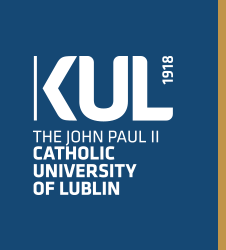News
Conference title: “Pray for the peace of Jerusalem” (Ps 122:6). The divine-human, messianic and eschatological gift of peace in the Holy Land
 Conference title: “Pray for the peace of Jerusalem” (Ps 122:6). The divine-human, messianic and eschatological gift of peace in the Holy Land
Conference title: “Pray for the peace of Jerusalem” (Ps 122:6). The divine-human, messianic and eschatological gift of peace in the Holy Land
Date: November 05-07 (Tuesday-Thursday) 2024
Suggested outline: Day 1: biblical papers (morning and afternoon sessions); Day 2: biblical and theological papers until lunch, afternoon tour, concert and dinner; Day 3: theological papers until noon, panel related to interreligious dialogue on peace in the Holy Land and closing luncheon.
Place: The John Paul II Catholic University of Lublin, Poland
Description: The Holy Land has been marked by wars and unrest since ancient times. The land flowing with milk and honey (Lev 20:24), which God offered to his people, had to be conquered by Israel. Breaking the covenant with God, the chosen people suffered invasions by foreign nations, found themselves in Babylonia, until finally, after two uprisings, they were exiled and dispersed, to return to the Promised Land after nearly two millennia. What should be done so that the precious gift of peace can dawn in the Holy Land? This question becomes all the more pertinent as we are watching the Israeli-Palestinian conflict, shaking anew the land of the patriarchs, the prophets, and Jesus. How does Scripture understand the meaning of peace in the Holy Land and what vision of it does it offer? What does God’s gift of peace require of the human community? How can we build peace in the Holy Land, and what can be the contribution of the three monotheistic religions that inhabit it?
These questions are the canvass for an academic conference organized by the Heschel Center for Catholic-Jewish Relations, together with the Institute of Biblical Studies and the Center for the Study of Second Temple Judaism at the Catholic University of Lublin. The conference will consist of two thematic blocks containing biblical-theological papers and a panel related to interreligious dialogue, in which we will consider the prospect of peace in the Holy Land. In the biblical part we would like to reflect on the topics like: peace and its relationship to the covenant in the OT, peace and the idea of holy war in the OT, the messianic and eschatological character of peace in the OT and in the literature of Second Temple period, renunciation of violence in the teaching of Jesus, peace and reconciliation in the NT, peace and the preaching of the gospel, the gospel of peace in confrontation with the Roman Empire, peace as a gift of the Risen One in the NT and in the teachings of the Church fathers.
Theologians, representatives of Judaism, Christianity and Islam, persons involved in Jewish Christian-Jewish and interreligious dialogue are invited to present papers covering issues like: the Church’s contemporary teaching on peace; the religious heritage of Judaism, Christianity and Islam in the service of peace; interreligious dialogue and the religious-theological foundations of peace in the Holy Land. In the concluding panel we want to reflect on the efforts that the representatives of the three monotheistic religions can make to foster peace in the Holy Land.
The conference will be accompanied by a concert, a tour of the synagogue and Lublin Castle, and a prayer for peace.
Biblical sessions (Tuesday, November 5)
- Balla (Papa Reformed Seminary): “The Concept of Holy War and Peace according to Joel 4”.
- H. Charlesworth (Princeton Theological Seminary): “Jesus’ Teachings on Peace in the Gospels Within it its First-Century Context”.
- Doedens (Papa Reformed Seminary): “Royal Blindness versus Prophetic Vision: Jeremiah’s and Zedekiah’s Polar Plans for Peace”.
- Dubovsky (Pontifical Biblical Institute, Rome): “How to Achieve Peace according to Some Selected Biblical Texts”.
- Eastman (Duke Divinity School): “No Salvation without the Other: Peace and Eschatological Patience in Romans”.
- Nicklas (University of Regensburg): “Love, Peace and Jewish Hatred according to the Gospel of John?”
- Rabens (Friedrich-Schiller-Universität Jena / Evangelische Kirche Mitteldeutschland): “Intercultural Understanding as a Means of Peace in Luke-Acts”.
- Wasiak (Adam Mickiewicz University, Poznan): „Where Is Peace? On earth (2,14) or in Haeven (19,38)? Luke’s Characterization of Peace”.
Theological sessions (Wednesday and Thursday, November 6 and 7)
- D’Costa (University of Bristol) (online participation): “Peace in Troubled Times. A Catholic Reflection on Some Jewish Responses to Pope Francis regarding the Israel/Gaza War”.
- Kurylo CB (Toulouse Ecole Biblique): “Great is peace, as all blessings are included in it.” – Midrash Vayikra Rabbah. Biblical Understanding of Peace in the Light of Rabbinical Texts”.
- Levy (the University of Eastern Finland): “True and False Peace - a Biblical, Theological, and Political Perspective”.
- Neuhaus SJ (Pontifical Biblical Institute, Jerusalem): “Teaching the Bible at the Heart of the Conflict: Can the Bible Teach Peace?”
- Skorka (Georgetown University): “The path for Peace” (from the Prophets to Rabbis).
- Shapiro (Israel Center for Jewish Christian Relations): “Praying for Peace”: Are We Praying for the Right Thing?”
- Szczerbiński (Adam Mickiewicz University, Poznan): “A Peaceful Vision of the State of Israel in the Statements of Jewish Reconctructionists”.
Discussion panel on peace in the Holy Land (Thursday, November 7)
- Pierbattista Pizzaballa (Latin Patriarch of Jerusalem) (online participation)
- Kurt Koch (Prefect of the Dicastery for Promoting Christian Unity) (online participation)
- Grzegorz Ryś (Head of the Committee for Dialog with Judaism, Polish Conference of Catholic Bishops)
- Kowalska NDS (Head of the Polish Council of Christians and Jews)
- Kurylo CB (Toulouse Ecole Biblique)
- Neuhaus SJ (Pontifical Biblical Institute, Jerusalem)
- Shapiro (Israel Center for Jewish Christian Relations)
- Skorka (Georgetown University)
- Wright (Catholic University of America, Washington DC)
- Żelazko (St. James Vicariate, Latin Patriarchate of Jerusalem)












